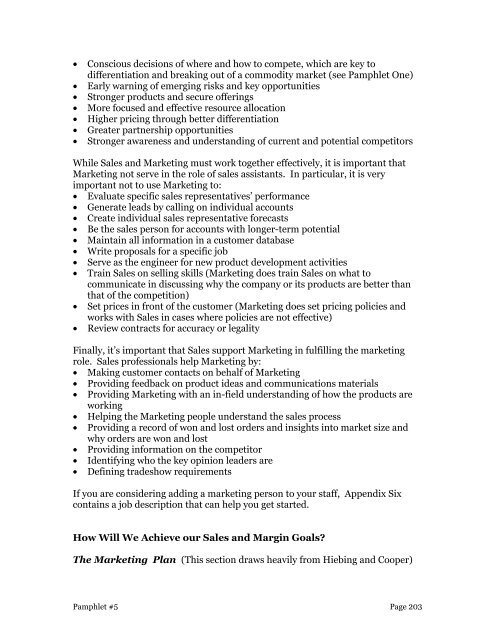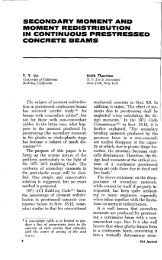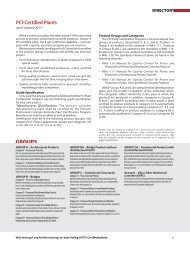Winning Without Competition: How to Break Out of a Commodity ...
Winning Without Competition: How to Break Out of a Commodity ...
Winning Without Competition: How to Break Out of a Commodity ...
Create successful ePaper yourself
Turn your PDF publications into a flip-book with our unique Google optimized e-Paper software.
• Conscious decisions <strong>of</strong> where and how <strong>to</strong> compete, which are key <strong>to</strong><br />
differentiation and breaking out <strong>of</strong> a commodity market (see Pamphlet One)<br />
• Early warning <strong>of</strong> emerging risks and key opportunities<br />
• Stronger products and secure <strong>of</strong>ferings<br />
• More focused and effective resource allocation<br />
• Higher pricing through better differentiation<br />
• Greater partnership opportunities<br />
• Stronger awareness and understanding <strong>of</strong> current and potential competi<strong>to</strong>rs<br />
While Sales and Marketing must work <strong>to</strong>gether effectively, it is important that<br />
Marketing not serve in the role <strong>of</strong> sales assistants. In particular, it is very<br />
important not <strong>to</strong> use Marketing <strong>to</strong>:<br />
• Evaluate specific sales representatives’ performance<br />
• Generate leads by calling on individual accounts<br />
• Create individual sales representative forecasts<br />
• Be the sales person for accounts with longer-term potential<br />
• Maintain all information in a cus<strong>to</strong>mer database<br />
• Write proposals for a specific job<br />
• Serve as the engineer for new product development activities<br />
• Train Sales on selling skills (Marketing does train Sales on what <strong>to</strong><br />
communicate in discussing why the company or its products are better than<br />
that <strong>of</strong> the competition)<br />
• Set prices in front <strong>of</strong> the cus<strong>to</strong>mer (Marketing does set pricing policies and<br />
works with Sales in cases where policies are not effective)<br />
• Review contracts for accuracy or legality<br />
Finally, it’s important that Sales support Marketing in fulfilling the marketing<br />
role. Sales pr<strong>of</strong>essionals help Marketing by:<br />
• Making cus<strong>to</strong>mer contacts on behalf <strong>of</strong> Marketing<br />
• Providing feedback on product ideas and communications materials<br />
• Providing Marketing with an in-field understanding <strong>of</strong> how the products are<br />
working<br />
• Helping the Marketing people understand the sales process<br />
• Providing a record <strong>of</strong> won and lost orders and insights in<strong>to</strong> market size and<br />
why orders are won and lost<br />
• Providing information on the competi<strong>to</strong>r<br />
• Identifying who the key opinion leaders are<br />
• Defining tradeshow requirements<br />
If you are considering adding a marketing person <strong>to</strong> your staff, Appendix Six<br />
contains a job description that can help you get started.<br />
<strong>How</strong> Will We Achieve our Sales and Margin Goals?<br />
The Marketing Plan (This section draws heavily from Hiebing and Cooper)<br />
Pamphlet #5 Page 203







